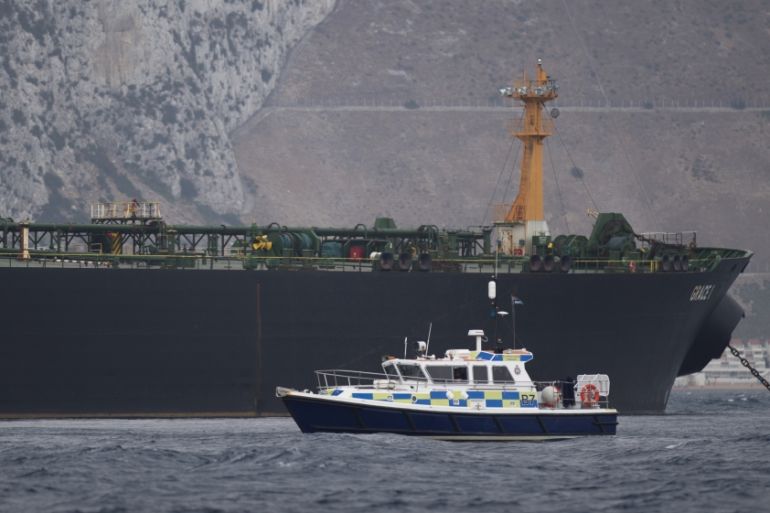Iran condemns UK’s seizure of oil tanker as ‘threatening act’
Officials say Tehran will not tolerate Britain’s ‘maritime robbery’ and deny claim tanker was on its way to Syria.

Iran has denounced Britain‘s detention of an Iranian tanker last week as “threatening” and an “act of piracy”, following a dramatic intervention that has sparked Tehran’s fury amid tensions over its nuclear programme.
|
|
British Royal Marines, police and customs agents on Thursday stopped and seized the Grace 1 vessel in Gibraltar on suspicion it carried Iranian crude oil to Syria in breach of European Union sanctions against President Bashar al-Assad ‘s government.
In a speech broadcast live on state television on Monday, the Iranian defence minister, Amir Hatami said the tanker’s seizure “will not be tolerated by us and will not go without a response”.
Describing the act as “threatening”, he added: “This is an incorrect and wrong action, an action similar to maritime robbery … certainly these kind of robberies will not be tolerated.”
Echoing Hatami’s sentiments, Foreign Minister Mohammad Javad Zarif said the vessel’s capture by Britain has set “a dangerous precedent and must end now”.
“Iran is neither a member of the EU nor subject to any European oil embargo. Last I checked, EU was against extraterritoriality. UK’s unlawful seizure of a tanker with Iranian oil on behalf of #B_Team is piracy, pure and simple,” Zarif tweeted.
Zarif has in the past said a so-called “B-team” – including President Donald Trump’s national security adviser John Bolton, Israeli Prime Minister Benjamin Netanyahu, and Saudi Crown Prince Mohammed bin Salman – could goad the US President Donald Trump into a conflict with Tehran.
Iran is neither a member of the EU nor subject to any European oil embargo.
Last I checked, EU was against extraterritoriality.
UK's unlawful seizure of a tanker with Iranian oil on behalf of #B_Team is piracy, pure and simple.
It sets a dangerous precedent and must end now.
— Javad Zarif (@JZarif) July 8, 2019
Authorities in Gibraltar, a British overseas territory on Spain’s southern tip, say the crude was destined for Syria’s Baniyas refinery.
Abbas Araghchi, Iran’s deputy foreign minister, told reporters in Tehran on Sunday that “the port named in Syria does not even have the capacity for such a supertanker to dock”.
“Its destination was somewhere else,” he said, without elaborating.
Gulf tensions
Araghchi said the tanker was crossing the Strait of Gibraltar because its “high capacity” meant “it was not possible for it to pass through the Suez Canal”. He added that Iran was currently following “the legal path through court” but hoped the issue could be resolved by diplomatic consultations.
Iran has demanded that the UK release the tanker immediately, with a senior commander in Iran’s elite Revolutionary Guard saying on Friday it was Tehran’s “duty” to do the same and seize a British oil tanker if its vessel was not released immediately.
On the same day, Gibraltar’s Supreme Court ruled the vessel could be held for 14 more days.
Iran has summoned the British ambassador twice to formally protest against the incident, according to Al Jazeera’s Dorsa Jabbari. “Iran says it does not recognise the EU’s sanctions on Syria as they have not been endorsed by the United Nations,” she added.
|
|
Spain’s Foreign Minister Josep Borrell said last week Gibraltar seized the supertanker after a request by the US.
Washington has reimposed punishing sanctions on Iran, including on its oil sector, after unilaterally abandoning a 2015 multilateral deal that offered Iran relief from global sanctions in exchange for curbs on its nuclear programme.
‘Economic war’
Tehran has accused the Trump administration of waging “economic war” against it with a “maximum pressure” campaign to reduce Iranian oil exports to zero.
Iranian crude exports were about 300,000 barrels per day (bpd) or less in late June, industry sources said, a fraction of the more than 2.5 million bpd Iran shipped in April 2018, the month before Trump withdrew from the nuclear deal.
European signatories to the deal – the UK, France and Germany – oppose Washington’s exit from the agreement, but have struggled to salvage it and protect Iran from the sanctions.
Iran has responded by announcing a phased reduction of compliance with the pact. On July 1, it surpassed uranium stockpile limits set by the treaty, and on Sunday said it would begin enriching uranium beyond the permitted cap “within hours”.
The heightened frictions between the US and Iran escalated to the brink of a military confrontation in June when Iranian forces shot down a US military drone it claimed had violated its airspace. Washington denies the claim, saying the spy plane was shot down over international waters.
|
|